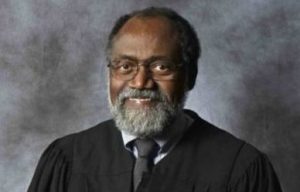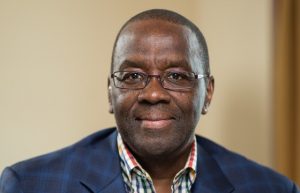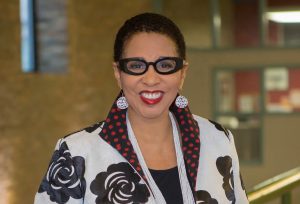
Location: Zoom
Contact: LeitnerCenter@law.fordham.edu
The Leitner Center and the Center on Race, Law and Justice present:
Black Lives Matter and the Criminal (In)Justice System: A Conversation with the Bench
Panelists:
 The Honorable Theodore A. McKee was sworn in as a judge of the U.S. Court of Appeals for the Third Circuit on June 20, 1994. He is only the fourth African- American to serve on the Third Circuit bench. Judge McKee graduated magna cum laude from Syracuse University College of Law in 1975. He received several awards for outstanding academic performance in law school, including induction into the Order of the Coif. Upon graduation from law school, Theodore McKee began his legal career in Philadelphia at Wolf, Block, Schorr & Solis-Cohen. He left the firm in 1977 to become assistant U.S. attorney for the Eastern District of Pennsylvania, serving that office until 1980 when he became deputy city solicitor in the administration of then-mayor William Green. There, he headed the enforcement division of the city’s law department. In 1983 he accepted a position as general counsel to the Philadelphia Parking Authority, and then ran successfully for the Court of Common Pleas. He served as a judge of the Court of Common Pleas for more than 11 years, including a three-year assignment to the homicide program. Toward the end of his first term, he became the first African-American assigned to the Orphans’ Court. In 1994 Judge McKee ran successfully for a second term on the Court of Common Pleas, but was appointed to the Third Circuit Court of Appeals by President Clinton shortly after winning retention to the Court of Common Pleas.
The Honorable Theodore A. McKee was sworn in as a judge of the U.S. Court of Appeals for the Third Circuit on June 20, 1994. He is only the fourth African- American to serve on the Third Circuit bench. Judge McKee graduated magna cum laude from Syracuse University College of Law in 1975. He received several awards for outstanding academic performance in law school, including induction into the Order of the Coif. Upon graduation from law school, Theodore McKee began his legal career in Philadelphia at Wolf, Block, Schorr & Solis-Cohen. He left the firm in 1977 to become assistant U.S. attorney for the Eastern District of Pennsylvania, serving that office until 1980 when he became deputy city solicitor in the administration of then-mayor William Green. There, he headed the enforcement division of the city’s law department. In 1983 he accepted a position as general counsel to the Philadelphia Parking Authority, and then ran successfully for the Court of Common Pleas. He served as a judge of the Court of Common Pleas for more than 11 years, including a three-year assignment to the homicide program. Toward the end of his first term, he became the first African-American assigned to the Orphans’ Court. In 1994 Judge McKee ran successfully for a second term on the Court of Common Pleas, but was appointed to the Third Circuit Court of Appeals by President Clinton shortly after winning retention to the Court of Common Pleas.
 Justice Willy Mutunga served as Chief Justice and President of the Supreme Court of Kenya from 2011 to 2016. After his tenure as Chief Justice, he served as the Common Wealth Secretary General’s special envoy for the Maldives until 2017. Justice Mutunga also previously served as a lecturer in the University of Nairobi’s Faculty of Law. There, the Justice was Secretary-General of the University Staff Union from April 1979 until July 1980, when the union was banned and he was detained for 16 months for his activism and work with the Legal Advice Centre in Nairobi. Justice Mutunga’s significant contributions to social justice initiatives in Kenya and extensive scholarship on human rights, law, and good governance have earned him several national and international honors including the Elder of the Golden Heart for his distinguished service to the nation and for his role in leading reforms in the Judiciary under the new Constitution (2010) and the Lifetime Achievement Award for the Protection and Promotion of Human Rights from the Kenya National Commission on Human Rights (2003). Among his many works are The Rights of Arrested and Accused Persons (1990), Constitution Making from the Middle: Civil Society and Transition Politics in Kenya, 1992-1997 (1999), and Governance and Leadership: Debating the African Condition: Mazrui and His Critics Vol. 1 and 2 (2003) with Alamin M. Mazrui, along with numerous articles and essays on human rights, law, and society. In addition to his legal work, Justice Mutunga has also engaged extensively with civil society and activist organizations including the Legal Advice Centre, the Law Society of Kenya, the Kenya Human Rights Commission, and the Citizens Coalition for Constitutional Change. Justice Mutunga received his Bachelor of Laws and Master of Laws degrees from the University of Dar-es-Salaam in Tanzania, and received a Doctorate Degree in Jurisprudence from Osgoode Hall Law School at York University in Toronto.
Justice Willy Mutunga served as Chief Justice and President of the Supreme Court of Kenya from 2011 to 2016. After his tenure as Chief Justice, he served as the Common Wealth Secretary General’s special envoy for the Maldives until 2017. Justice Mutunga also previously served as a lecturer in the University of Nairobi’s Faculty of Law. There, the Justice was Secretary-General of the University Staff Union from April 1979 until July 1980, when the union was banned and he was detained for 16 months for his activism and work with the Legal Advice Centre in Nairobi. Justice Mutunga’s significant contributions to social justice initiatives in Kenya and extensive scholarship on human rights, law, and good governance have earned him several national and international honors including the Elder of the Golden Heart for his distinguished service to the nation and for his role in leading reforms in the Judiciary under the new Constitution (2010) and the Lifetime Achievement Award for the Protection and Promotion of Human Rights from the Kenya National Commission on Human Rights (2003). Among his many works are The Rights of Arrested and Accused Persons (1990), Constitution Making from the Middle: Civil Society and Transition Politics in Kenya, 1992-1997 (1999), and Governance and Leadership: Debating the African Condition: Mazrui and His Critics Vol. 1 and 2 (2003) with Alamin M. Mazrui, along with numerous articles and essays on human rights, law, and society. In addition to his legal work, Justice Mutunga has also engaged extensively with civil society and activist organizations including the Legal Advice Centre, the Law Society of Kenya, the Kenya Human Rights Commission, and the Citizens Coalition for Constitutional Change. Justice Mutunga received his Bachelor of Laws and Master of Laws degrees from the University of Dar-es-Salaam in Tanzania, and received a Doctorate Degree in Jurisprudence from Osgoode Hall Law School at York University in Toronto.
 Judge Ann Clare Williams (Ret.), is devoted to promoting the effective delivery of justice worldwide, particularly in Africa, where she has partnered with judiciaries, attorneys, NGOs, and the U.S. Departments of Justice and State to lead training programs in Ghana, Indonesia, Kenya, Liberia, Namibia, Nigeria, Rwanda, Tanzania, Uganda, and Zambia. She also has taught at the International Criminal Tribunals for Rwanda and the former Yugoslavia. President Ronald Reagan nominated her in 1985 to the U.S. District Court, Northern District of Illinois, making her the first woman of color to serve on a district court in the three-state Seventh Circuit. In 1999, President William Clinton’s nomination made her the first and only judge of color to sit on the U.S. Court of Appeals for the Seventh Circuit and the third African American woman to serve on any federal circuit court. She brings her vast experience on the bench to serve as a resource for the Firm’s leading trial and appellate practices. Judge Williams has served on many judicial committees and, as treasurer and president of the Federal Judges Association, was the first person of color to become an officer. Committed to public interest work she helped found Just The Beginning — A Pipeline Organization, the Black Women Lawyers’ Association of Chicago, Minority Legal Education Resources, and the Public Interest Fellowship Program for Equal Justice Works. She serves on the boards of the Carnegie Corporation of New York, University of Notre Dame, National Institute for Trial Advocacy (NITA), Weinstein International Foundation, iCivics, and Museum of Science & Industry Chicago.
Judge Ann Clare Williams (Ret.), is devoted to promoting the effective delivery of justice worldwide, particularly in Africa, where she has partnered with judiciaries, attorneys, NGOs, and the U.S. Departments of Justice and State to lead training programs in Ghana, Indonesia, Kenya, Liberia, Namibia, Nigeria, Rwanda, Tanzania, Uganda, and Zambia. She also has taught at the International Criminal Tribunals for Rwanda and the former Yugoslavia. President Ronald Reagan nominated her in 1985 to the U.S. District Court, Northern District of Illinois, making her the first woman of color to serve on a district court in the three-state Seventh Circuit. In 1999, President William Clinton’s nomination made her the first and only judge of color to sit on the U.S. Court of Appeals for the Seventh Circuit and the third African American woman to serve on any federal circuit court. She brings her vast experience on the bench to serve as a resource for the Firm’s leading trial and appellate practices. Judge Williams has served on many judicial committees and, as treasurer and president of the Federal Judges Association, was the first person of color to become an officer. Committed to public interest work she helped found Just The Beginning — A Pipeline Organization, the Black Women Lawyers’ Association of Chicago, Minority Legal Education Resources, and the Public Interest Fellowship Program for Equal Justice Works. She serves on the boards of the Carnegie Corporation of New York, University of Notre Dame, National Institute for Trial Advocacy (NITA), Weinstein International Foundation, iCivics, and Museum of Science & Industry Chicago.
Moderator:
 Professor Gemma Solimene is a Clinical Associate Professor of Law at Fordham University School of Law. Professor Solimene has over 28 years of experience representing underserved New Yorkers. While at Fordham, Professor Solimene has directed the Immigrant Rights Clinic, through which students primarily represent individuals who are seeking to maintain or obtain legal immigration status in the U.S, and has taught in various other clinics in the Law School’s Clinical Program, including the Social Justice Clinic and the Federal Litigation Clinic. In addition to the clinics, Professor Solimene has taught Immigration Law, a simulation-based skills course, an externship seminar, and an Ethics in Public Interest Law course. Professor Solimene has been a panelist and presenter on numerous topics related to immigration and clinical teaching, and has conducted trial skills trainings for law firms. Prior to joining the Fordham Law faculty in 1999, Professor Solimene spent the bulk of her career working in the public interest. She litigated cases at The Legal Aid Society’s Civil Division and was the Attorney-in-Charge of The Legal Aid Society’s Immigration Law Unit. Professor Solimene also taught in the NYU School of Law Clinical Program from 1993 to 1996 and was a Pro Se Law Clerk in the Second Circuit Court of Appeals. Professor Solimene received her BA magna cum laude for S.U.N.Y. Stony Brook and her JD from NYU School of Law.
Professor Gemma Solimene is a Clinical Associate Professor of Law at Fordham University School of Law. Professor Solimene has over 28 years of experience representing underserved New Yorkers. While at Fordham, Professor Solimene has directed the Immigrant Rights Clinic, through which students primarily represent individuals who are seeking to maintain or obtain legal immigration status in the U.S, and has taught in various other clinics in the Law School’s Clinical Program, including the Social Justice Clinic and the Federal Litigation Clinic. In addition to the clinics, Professor Solimene has taught Immigration Law, a simulation-based skills course, an externship seminar, and an Ethics in Public Interest Law course. Professor Solimene has been a panelist and presenter on numerous topics related to immigration and clinical teaching, and has conducted trial skills trainings for law firms. Prior to joining the Fordham Law faculty in 1999, Professor Solimene spent the bulk of her career working in the public interest. She litigated cases at The Legal Aid Society’s Civil Division and was the Attorney-in-Charge of The Legal Aid Society’s Immigration Law Unit. Professor Solimene also taught in the NYU School of Law Clinical Program from 1993 to 1996 and was a Pro Se Law Clerk in the Second Circuit Court of Appeals. Professor Solimene received her BA magna cum laude for S.U.N.Y. Stony Brook and her JD from NYU School of Law.
Previous events in the Black Lives Matter Series:
Black Lives Matter: Protest, Police Violence , and the Pandemic





